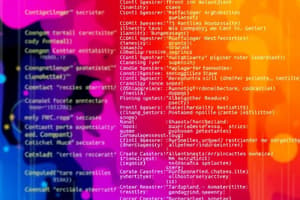Podcast
Questions and Answers
What is the primary goal of the requirements phase in software development?
What is the primary goal of the requirements phase in software development?
- To model the structure of the software system
- To gather and document the system requirements (correct)
- To build structural and behavior models of the software
- To allocate functionality to system components
Which tool is specifically mentioned as a way to systematically record requirements information?
Which tool is specifically mentioned as a way to systematically record requirements information?
- Use case models
- UML diagrams
- Volere template (correct)
- Behavior models
What does the analysis phase primarily focus on in software development?
What does the analysis phase primarily focus on in software development?
- Determining the hardware needed for the system
- Documenting the project's financial costs
- Modeling the structure and behavior from a user’s perspective (correct)
- Designing the user interface of the system
What evolves into the analysis model during the analysis phase?
What evolves into the analysis model during the analysis phase?
What is the main focus of the design phase in software development?
What is the main focus of the design phase in software development?
In which phase are architectural decisions about the overall structure of the system made?
In which phase are architectural decisions about the overall structure of the system made?
Which type of diagrams are used in the design phase to illustrate interaction between classes?
Which type of diagrams are used in the design phase to illustrate interaction between classes?
What is modeled during the analysis phase using use cases and software requirements?
What is modeled during the analysis phase using use cases and software requirements?
Which characteristic indicates that a software system effectively meets the needs of its users?
Which characteristic indicates that a software system effectively meets the needs of its users?
What factor primarily influences the maintainability of a software system?
What factor primarily influences the maintainability of a software system?
Why does the likelihood of errors increase with software complexity?
Why does the likelihood of errors increase with software complexity?
Which of the following is NOT a characteristic of a good software system?
Which of the following is NOT a characteristic of a good software system?
What is a key challenge faced by legacy systems?
What is a key challenge faced by legacy systems?
What characteristic allows a software system to easily adapt to changing user needs?
What characteristic allows a software system to easily adapt to changing user needs?
How does size relate to the occurrence of errors in software systems?
How does size relate to the occurrence of errors in software systems?
What primary aspect does the cost of change in software relate to?
What primary aspect does the cost of change in software relate to?
What is the main benefit of iterative and incremental development?
What is the main benefit of iterative and incremental development?
Which characteristic distinguishes agile development from traditional methods?
Which characteristic distinguishes agile development from traditional methods?
What is referred to as 'plan-driven development'?
What is referred to as 'plan-driven development'?
What is a key challenge in large software development projects?
What is a key challenge in large software development projects?
What is a common feature of agile methods?
What is a common feature of agile methods?
How can increments in software development be managed?
How can increments in software development be managed?
Which phrase best describes the goal of agile development?
Which phrase best describes the goal of agile development?
What aspect of iterative development increases as more iterations are completed?
What aspect of iterative development increases as more iterations are completed?
What is a primary characteristic of software development that aligns it with engineering disciplines?
What is a primary characteristic of software development that aligns it with engineering disciplines?
Which of the following describes the relationship between activities in the software development process?
Which of the following describes the relationship between activities in the software development process?
What distinguishes a customer from a user in software development?
What distinguishes a customer from a user in software development?
Which of the following activities comes first in the software development process?
Which of the following activities comes first in the software development process?
What is the term used to describe the order in which software development activities are carried out?
What is the term used to describe the order in which software development activities are carried out?
What characterizes a disciplined approach to software development?
What characterizes a disciplined approach to software development?
Which statement accurately reflects the importance of validation and verification in software development?
Which statement accurately reflects the importance of validation and verification in software development?
Which of the following best defines 'deliverables' in the software development process?
Which of the following best defines 'deliverables' in the software development process?
Which statement best describes what a model is in software development?
Which statement best describes what a model is in software development?
Design in the software development process primarily involves which of the following?
Design in the software development process primarily involves which of the following?
What is one key aspect of an agile approach to software development?
What is one key aspect of an agile approach to software development?
In software development, which type of process model emphasizes a cyclical approach?
In software development, which type of process model emphasizes a cyclical approach?
How does agile modeling differ from traditional modeling approaches?
How does agile modeling differ from traditional modeling approaches?
What is the primary purpose of a model in the context of software development?
What is the primary purpose of a model in the context of software development?
What is an essential feature of a 'good model' in software development?
What is an essential feature of a 'good model' in software development?
What role does documentation play in software development?
What role does documentation play in software development?
Flashcards are hidden until you start studying
Study Notes
Measuring Complexity
- Software complexity increases as the amount of explanation needed to describe its features increases.
- Higher complexity is associated with an increased likelihood of errors.
- The size of software is another factor influencing error rate. Larger software systems are more prone to errors.
Characteristics of a Good Software System
- A software system should effectively meet its users' needs:
- Useful: Satisfies the users' requirements.
- Usable: Provides an easy-to-use and user-friendly interface.
- Reliable: Minimizes errors to ensure user tasks can be performed.
- Flexible: Allows for easy modifications as time progresses.
- Available: Operates in the intended environment.
- Affordable: Meets the agreed-upon deadlines and costs.
Maintainability and Flexibility
- Users should be able to evaluate the system to see if it fits their needs, requiring availability.
- Developers should be able to adapt the system to evolving user requirements, requiring flexibility.
- Maintainability means the system is written and documented in a manner that makes changes easy to implement.
- Developer practices during development greatly impact the ease of maintenance and, consequently, the cost of changes.
- Design and writing techniques significantly influence the maintainability of software.
Legacy Systems
- Legacy systems are custom-built or adapted from standard systems.
- They are typically large and critical to the business.
- They may have undergone numerous changes since their inception, making understanding and maintenance challenging.
- Limited documentation or experienced personnel can further complicate legacy systems.
Software Development is an Engineering Discipline
- Software development, like engineering, aims to meet clearly defined requirements.
- Both fields utilize defined processes with distinct activities and identifiable deliverables.
- Developers apply their skills and experience to assigned tasks.
- Validation and verification are crucial steps, just as important as building the software.
- Software development employs appropriate tools and standards.
- There's a code of practice that guides the development process.
Development Process and Life cycle
- A development process is a set of rules defining how a software development project is executed.
- It involves a series of software engineering activities with defined inputs and outputs.
- The sequence of these activities is called a life cycle or process model, outlining the overall development process.
- Customers pay for the software, while users utilize it on a daily basis.
Typical Technical Activities in Software Development
- Domain modeling: Understanding the environment where the system will be implemented, including business processes and rules.
- Requirements engineering:
- Identifying the problem (requirements elicitation).
- Categorizing, prioritizing, and modeling requirements (requirements analysis). This defines the system's functionality.
- Design: Determining how to solve the problem.
- Implementation: Executing the solution.
- Testing: Ensuring the software meets quality standards.
- Integration: Combining different parts of the software into a cohesive system.
- Iterative and incremental development:
- Each iteration is a complete mini-project with a fixed duration (timeboxed).
- These iterations encompass requirements, design, implementation, testing, and integration, resulting in a partially functional system.
- Each iteration adds complexity, ultimately leading to the final system.
Iterative and Incremental Development benefits
- Users get valuable and workable software faster.
- Developers can incorporate user feedback as the project progresses.
- Increments can be developed sequentially or concurrently based on project needs.
Agile Development
- Agile development is a popular approach to software development, emphasizing flexibility and iteration.
- It encompasses a set of practices promoting simpler, faster, and adaptable software development.
- Continuously aligning development goals with user needs and expectations aims to create more effective software.
- Agile development prioritizes people and functional software within the development process.
Risk Management in Development
- A software solution must be considered within the context of the domain to manage project risks.
- Large projects are inherently riskier due to the increased probability of errors.
- Software development is similar to engineering in its use of defined processes, activities, and testable deliverables.
- A basic software development process provides rules for project execution, encompassing activities and an ordered life cycle or process model.
- Process models can be sequential, iterative, incremental, or a combination of these.
- A disciplined approach to software development necessitates documentation of activities for both individual and project perspectives.
- Documentation is crucial for achieving the required level of traceability.
- An agile development approach emphasizes people, working software, short iterations, and adapting to change. It promotes collaborative software development practices.
Modeling in Software Development
- Modeling is a way of conceptualizing real-world ideas and things.
- A model in software development provides an abstract representation of a specification, design, or system from a specific perspective.
- Modeling is used to simplify complexity, focusing on essential aspects while omitting non-essential details.
- In software development, models serve as:
- A means of understanding problems.
- A communication tool, particularly between developers.
- A component of methods employed in activities like analysis and design.
Agile Modeling
- Agile modeling, developed by Scott Ambler, emphasizes lighter modeling techniques.
- It promotes values, principles, and practices to guide software developers in adopting agile modeling.
Activities and Artifacts in the Development Process
- Requirements:
- Collecting and documenting system requirements.
- Defining the system's expected functionality and qualities to meet stakeholders' needs.
- Analysis:
- Modeling the structure and behavior of a software solution from a user's perspective.
- Building structural and behavioral models based on use cases and software requirements.
- Creating an analysis model that represents entities in a software solution.
- Determining system operations to demonstrate how behavior is implemented.
- Making architectural decisions regarding the overall system structure.
- Design:
- Making decisions about how the system will meet its specifications.
- Allocating expected functionality to different parts of the system.
Studying That Suits You
Use AI to generate personalized quizzes and flashcards to suit your learning preferences.




